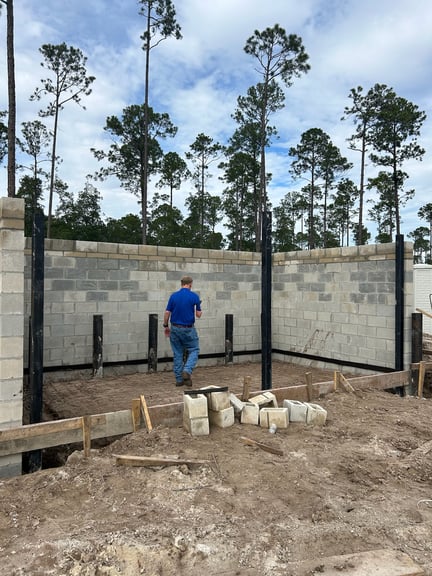Building Inspections: Using the County and a Private Provider
January 12th, 2024 | 2 min. read

As discussed in the previously uploaded blog, “What are the two ways to schedule inspections?”, we dove into some advantages and disadvantages of either scheduling through a private provider or the building department. While it is up to your discretion how to schedule inspections, you first should consider the characteristics of each such as budget, the type of licenses the inspectors have, and the entire scheduling procedure.
A common question that clients ask when scheduling inspections is if private providers can do some of their inspections and the county performs the rest. For example, you may request the county to perform your insulation inspections and if they don't have an available inspector for your final, you want to partner with a private provider.
While this may seem like an easy fix to scheduling issues, unavailable inspectors, or personal preference, it cannot be done according to the jurisdiction.
 At the start of your project and before inspections begin, it is crucial that you choose the right scheduling path. Due to potential liabilities, private providers cannot perform any inspections after the county has performed the prerequisite inspections.
At the start of your project and before inspections begin, it is crucial that you choose the right scheduling path. Due to potential liabilities, private providers cannot perform any inspections after the county has performed the prerequisite inspections.
If the county passes the rough inspection but a private provider comes in and performs the electrical, there are liabilities within the private provider not having been able to inspect the rough and electrical.
Expanding on the critical decision-making process for inspection scheduling, it's imperative to delve into the intricacies surrounding the collaboration of private providers and county inspections.
While the idea of having the county handle specific inspections while relying on private providers for others may seem like a practical solution, it's essential to comprehend the jurisdictional constraints that make this approach unfeasible.
Clients often inquire about the possibility of segregating inspection responsibilities between private providers and the county. For instance, one might opt for the county to oversee insulation inspections and engage a private provider for the final inspection. However, jurisdictions strictly prohibit such a mix-and-match strategy due to potential liabilities.
The jurisdictional stance is grounded in the need for a seamless inspection process that adheres to established protocols. Once the county completes prerequisite inspections, introducing a private provider for subsequent inspections, such as electrical, can introduce complications. The liability arises from the private provider not having inspected the earlier stages, like the rough inspection. This misalignment in the inspection sequence can lead to overlooked issues, posing risks to the overall project integrity.
Therefore, it becomes paramount to choose the appropriate inspection scheduling path from the project's inception. The decision should align with factors such as budget constraints, inspector qualifications, and the overall procedural requirements. Navigating this decision-making process with careful consideration ensures a smoother inspection process that contributes positively to the overall building project.
It's noteworthy that private providers operate under distinct guidelines and procedures for inspections. Legacy Engineering, for instance, offers a comprehensive array of private provider services with detailed insights available on our inspection service page.
For a more comprehensive understanding of inspections, the inspection knowledge base section provides additional resources, covering aspects such as cost breakdowns, scheduling procedures, and the required documentation. By arming yourself with this knowledge, you empower your project with the necessary information for a successful and compliant inspection journey.
To conclude, selecting the appropriate inspection scheduling path is a critical decision that must be made at the correct stage of the building process, regardless if your project is residential or commercial. While some clients often inquire about mixing county and private provider services for inspections, jurisdictions avoid this approach due to potential liabilities. Careful consideration of budget, inspector qualifications, and general procedures is essential to ensure a smooth inspection process that improves your building process.
All private providers have different guidelines and procedures when it comes to inspections. To view Legacy Engineering’s private provider services, please click here to be redirected to our inspection service page. As for inspections, there are several resources within the inspection knowledge base section highlighting cost, scheduling procedures, and required documents.
Topics: